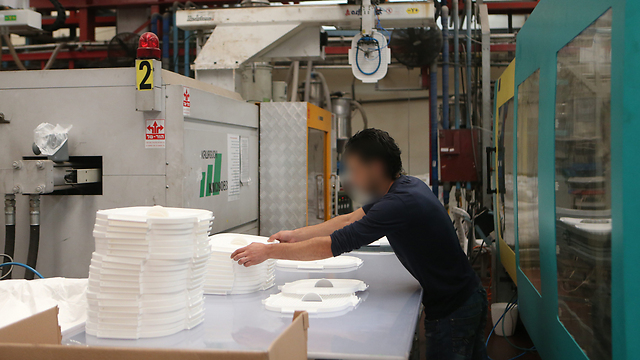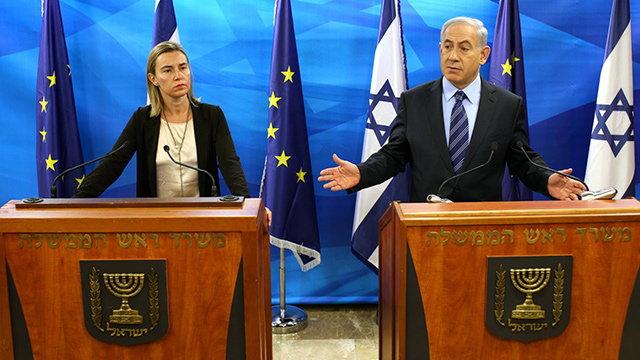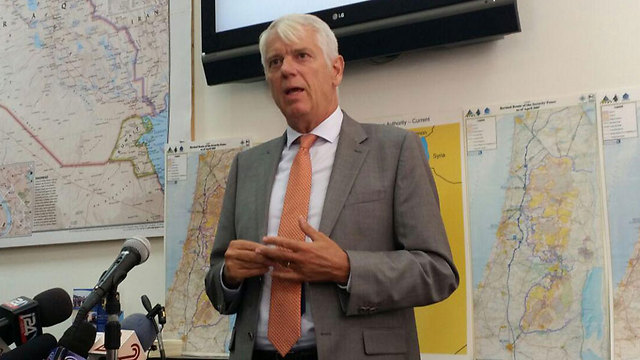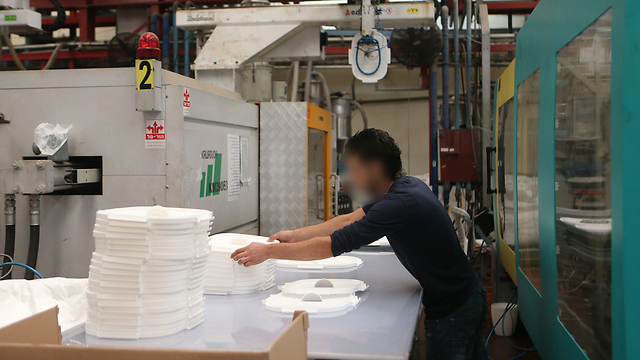Israel has decided to fight back against the European Union’s decision to start labeling goods produced in the West Bank, the Gaza Strip and the Golan Heights, starting with measures take against 16 European countries that pushed for product labeling in April.
The countries Israel plans to take measures against are the UK, France, Spain, Denmark, Ireland, Croatia, Malta, the Netherlands, Sweden, Portugal, Slovenia, Italy, Luxembourg, Austria, Belgium and Finland.
Government sources said that ahead of the decision, Prime Minister Benjamin Netanyahu wrote to the EU foreign policy chief, Federica Mogherini, warning her that the move would likely damage relations between Israel and the European Union.

A worker in a factor in Barkan, the West Bank, labels products. (Photo: Alex Kolomoisky)
Several of the countries concerned – such as Italy and the Netherlands – have good relations with Israel, meaning that any measures taken against them will be less pronounced than those taken against countries whose relations with Israel are slightly cooler, such as Ireland and Sweden.
The measures include a re-evaluation of the EU’s role in the peace process; summoning the ambassadors of the 16 countries to the Foreign Ministry for an official rebuke; and restricting meetings between ambassadors and senior Israeli officials to low-level government staffers.
This will naturally diminish the influence those ambassadors will have in their role. The visits of foreign representatives from the countries concerned will also be restricted, with their meetings unlikely to include time with the prime minister or the president.
Furthermore, the government will be far stricter regarding entry of foreign delegations to the West Bank and the Gaza Strip. In certain situations, their entry may even be denied.

Prime Minister Netanyahu, right, warned EU foreign policy chief Mogherini, left, against such a move (Photo: Amit Shaabi)
“From now on we will be very measured in how we behave with these visitors,” a senior Israeli official said. “We will be control the flow of (passage) and will not authorize things automatically.”
Israel will also be stricter about which EU projects it permits in the West Bank and the Gaza Strip. For the EU, these projects are designed to give them footing and influence in the area.
“They lead many projects which need our support, but you can’t act against us and then expect that everything will continue as normal,” said the official.
The final measure will be the reduction and postponement of dialogue between Israel and the EU. This is considered in Israel to be an especially important area for the EU, which is said to frequently request discussions on strategy, fighting terrorism, dealing with immigrants and more.
The government source agrees. “Whoever takes hostile measures against us will pay the price.”
Nonetheless, he says, the steps planned are measured and thought-out. “We decided (the steps) for each country on their own merits. This is not mathematics but diplomacy; clearly, the measures are not going to harm our own interests.
“It would be foolish to take steps that will also harm us. We had to walk a tightrope between things we wanted to do so that they would get the message and not hurting ourselves.”
Meanwhile, EU’s ambassador to Israel, Lars Faaborg-Andersen. insisted on Wednesday that the decision to label Israeli products does not mean Europe is boycotting Israel, or the settlements.

EU ambassador to Israel Lars Faaborg-Andersen (Photo: Yael Friedson)
“I’ve been shocked to hear claims of anti-Semitism and historical comparisons or analogies to the persecution of Jews in Germany in the 30s and 40s,” Faaborg-Andersen said at the Jerusalem Post’s Diplomatic Conference in Jerusalem.
“In my mind this is a distortion of history and belittlement of the crimes of the Nazis, and the memory of their victims,” he added.
“The European Union has been accused of a variety of sins, including today from this podium,” Faaborg-Andersen bemoaned. “Anti-Semitism, hypocrisy, immorality, rewarding terrorism, destroying Palestinian jobs. These allegations have been made by people coming from the highest echelons in this country.”
He said those making these accusations ought to read the EU document.
He also accused Israel of hypocrisy. “How is the stated commitment to a two-state solution compatible with continued building in settlements, including in many settlements beyond the separation barrier that would not be part of Israel in any peace agreement?
“Like Prime Minister Netanyahu, we have not given up our hope for peace and a two-state solution,” he continued. “True, settlements are certainly not the only problem – but they are definitely a significant and crucial problem.”
http://www.ynetnews.com/articles/0,7340,L-4727719,00.html









